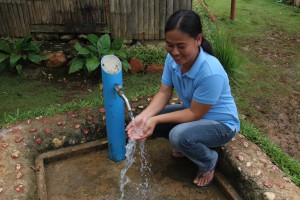
Through the hard work of Marissa Nim and other Kalahi-CIDSS volunteers, Brgy. Kauswagan in Manjuyod, Negros Oriental now enjoys clean flowing water.
The sun is high. Her heels are numb and her legs feel like wood. But she has to go on. There is one more hour. She cannot return empty-handed.
Marissa Nim thought of this as she walked 2 to 3 hours just to have water at home. Three kilometers of walking with a gallon of water in each hand—this used to be daily life.
Like others in Brgy. Kauswagan, Manjuyod, Negros Oriental, her family had to fetch water from a far-away area to have something for cooking, cleaning, or, in lucky times, bathing.
But this all changed when Kalahi-CIDSS came.
Kalahi-CIDSS stands for Kapit-Bisig Laban sa Kahirapan-Comprehensive and Integrated Delivery of Social Services, one of the three core poverty alleviation programs of the Department of Social Welfare and Development (DSWD). It urges communities to work together to achieve their identified needs.
With the arrival of the program in their village, Marissa immediately volunteered. Finally, here was a chance to end the long walk for water.
Kalahi-CIDSS provided funding and educated the community on how to make proposals and even on how to build their subproject. The construction of a Level II Water System in their neighborhood topped the list.
Farmers became engineers and housewives became financial analysts. Everybody had a role to play. The Kalahi-CIDSS experts lived with them to guide them.
Thus, even with cynics on standby, Marissa and her neighbors labored to make a Pump-Driven Water System. They opened a bank account and used the money to buy pipes, nails, cement, and everything they needed.
They also consulted with experts and asked for seedlings to plant around their water source for its sustainability.
Long walk over
The water system has now been constructed in Barangay Kauswagan. Finally, their daily struggle for water is over.
“Now, the long walks to get just two gallons of water are a thing of the past,” Marissa happily shared.
She added, “We can now even have backyard gardens and build clean comfort rooms because water is just within reach.”
The availability of water also made it possible for them to raise hogs and poultry in their backyards, thus, providing them additional sources of income.
Upon seeing the completion of the water system, those who doubted at first eventually became believers and contributed in maintaining the project.
Barangay councilor Agustin Sarap also testified to the success of the project. “Karon, ma-maintain na namo ang insaktong kahinlo sa panimalay, makaadto na kami sa among baol sa sayong oras. Makapahuway na jud mi sa gilay-on nga kaniadto among lakawon paingon sa gikuhaan namog tubig. (Now, we can already maintain the right cleanliness in our homes and go to our farms early. Finally, we can rest from the long walk to the water source),” he said.
Marissa’s journey
Their community now strives as one to improve their way of life. Like her neighbors, Marissa has also learned to transform for the better. Being a Kalahi-CIDSS volunteer honed her personality and made her a confident and empowered worker.
From being a housewife, Marissa transformed from a day care worker to a family health care volunteer and eventually, to a neighborhood leader. Seeing her dedication to the realization of the water system, the residents of Barangay Kauswagan elected her as one of their barangay councilors.
DSWD also noticed Marissa’s active involvement in improving the condition of their barangay.
Consequently, she was chosen as Kalahi-CIDSS hero, bagging the Bayani Ka! Award as a leader in environmental protection.
It was a long journey to development but it was well worth it, both for Barangay Kauswagan and for Marissa. – Cheryl Baldicantos-Boholano, Kalahi-CIDSS Social Marketing Officer ###


